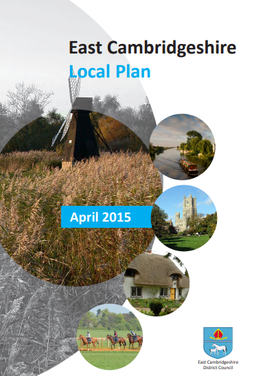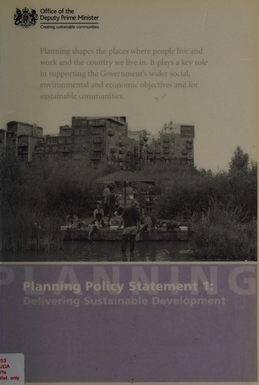
The Resource Management Act (RMA) passed in 1991 in New Zealand is a significant, and at times, controversial Act of Parliament. The RMA promotes the sustainable management of natural and physical resources such as land, air and water. New Zealand's Ministry for the Environment describes the RMA as New Zealand's principal legislation for environmental management.
Town and country planning in the United Kingdom is the part of English land law which concerns land use planning. Its goal is to ensure sustainable economic development and a better environment. Each country of the United Kingdom has its own planning system that is responsible for town and country planning, which outside of England is devolved to the Northern Ireland Assembly, the Scottish Parliament and the Senedd.
Regional spatial strategies (RSS) provided regional level planning frameworks for the regions of England outside London. They were introduced in 2004. Their revocation was announced by the new Conservative/Liberal Democrat government on 6 July 2010.

The London Plan is the statutory spatial development strategy for the Greater London area in the United Kingdom that is written by the Mayor of London and published by the Greater London Authority. It is updated from time to time.
In the United Kingdom, Planning Policy Guidance Notes (PPG) were statements of the Government's national policy and principles towards certain aspects of the town planning framework. They were material considerations in the determination of planning applications. Under the provisions of the Planning and Compulsory Purchase Act 2004, PPGs were gradually being replaced by Planning Policy Statements (PPS). In recent years prior to their withdrawal they applied to England only.

A local development framework is the spatial planning strategy introduced in England and Wales by the Planning and Compulsory Purchase Act 2004 and given detail in Planning Policy Statements 12. In most parts of the two countries, maintaining the framework is the responsibility of English district councils and Welsh principal area councils.

A development plan sets out a local authority's policies and proposals for land use in their area. The term is usually used in the United Kingdom. A local plan is one type of development plan. The development plan guides and shapes day-to-day decisions as to whether or not planning permission should be granted, under the system known as development control. In order to ensure that these decisions are rational and consistent, they must be considered against the development plan adopted by the authority, after public consultation and having proper regard for other material factors.
Structure planning is a type of spatial planning and is part of urban planning practice in the United Kingdom and Western Australia. A structure plan in any jurisdiction will usually consist of a written component, supported by maps, photographs, sketches, tables and diagrams and a 'plan' component consisting of one or more plans illustrating land use and infrastructure proposals for the area being planned.
In United Kingdom planning law, a unitary development plan (UDP) is a development plan prepared by a metropolitan district, London Borough or some unitary local authorities.

Planning Policy Statement 6: Planning for Town Centres is a document produced by the British Government to advise Local planning authorities on planning for the future of town centres. The current version was introduced in March 2005 and replaced Revised PPG 6: Town Centres and Retail Developments and subsequent policy statements.
Planning Policy Statement 7: Sustainable Development in Rural Areas commonly abbreviated as PPS 7, is a document produced by the British Government to advise Local planning authorities on policies for rural areas. The current version was introduced in August 2004 and replaced Revised PPG 7: The Countryside - Environmental Quality and Economic and Social Development.
Planning Policy Statement 9: Biodiversity and Geological Conservation commonly abbreviated as PPS9, was a document produced by the British Government to advise Local planning authorities on planning policies for the protection of biodiversity and geological conservation through the planning system. This Planning Policy Statement was introduced in August 2005 and replaced Revised PPG 9: Nature conservation. PPS9 was reinforced and updated by Office of the Deputy Prime Minister (ODPM) Circular 06/2005: Biodiversity and Geological Conservation - Statutory Obligations and Their Impact Within the Planning System, also published by the British Government on 15 August 2005.
Planning Policy Statement 10: Planning for Sustainable Waste Management commonly abbreviated as PPS 10, is a document produced by the British Government and forms part of the National Waste Management Plan for the United Kingdom. The current version was introduced in July 2005 and replaced Revised PPG 10: Planning and Waste Management.
Planning Policy Statement 22: Renewable Energy commonly abbreviated as PPS 22, is a document produced by the British Government which sets out the Government's policies for renewable energy, which planning authorities should have regard to when preparing local development documents and when taking planning decisions. The current version was introduced in August 2004 and replaced Revised PPG 22.
Planning Policy Statement 23: Planning and Pollution Control commonly abbreviated as PPS 23, is a document produced by the British Government and intended to complement the new pollution control framework under the Pollution Prevention and Control Act 1999 and the PPC Regulations 2000. The current version was introduced in November 2004 and replaced Revised PPG 23: Planning and Pollution Control.
Minerals Planning Guidance Notes (MPGs) were statements of the British government’s policy on minerals and planning issues and provide advice and guidance to local authorities and the minerals industry on policies and the operation of the planning system with regard to minerals.

The Environment Court of New Zealand is a specialist court for plans, resource consents and environmental issues. It mainly deals with issues arising under the Resource Management Act, meaning that it covers a wide range of potential future effects of planning applications, which can include such areas as traffic congestion, noise/pollution emissions and social and commercial consequences, rather than just the 'ecological' aspects that could be implied by the 'environmental' term.
Town and country planning in Wales is based on the land use planning system which applies in England. However, the system in Wales has some distinctive features which have arisen because substantial responsibility for town and country planning has been devolved to the Welsh Government (WAG). In particular, Wales now has a Spatial Plan and Welsh Ministers have a duty under the Government of Wales Act 2006 to promote sustainable development.

The Transport Integration Act 2010 is a law enacted by the Parliament of the State of Victoria, Australia. The Act is the prime transport statute in Victoria, having replaced major parts of the Transport Act 1983, which was renamed as the Transport Act 1983.

The National Planning Policy Framework (NPPF) is a land-use planning policy in England. It was originally published by the UK's Department of Communities and Local Government in March 2012, consolidating over two dozen previously issued documents called Planning Policy Statements (PPS) and Planning Policy Guidance Notes (PPG) for use in England. It has since been revised in 2018, 2019, 2021 and twice in 2023. The live version is from December 2023.







